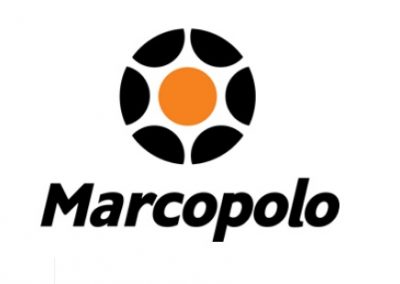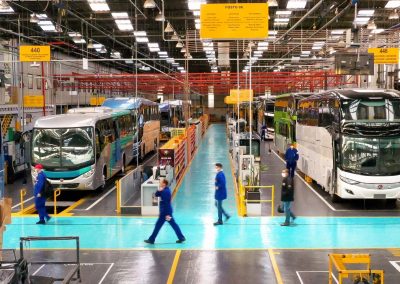MARCOPOLO RECORDS SALES GROWTH IN THE FIRST QUARTER OF 2020

MARCOPOLO RECORDS SALES GROWTH IN THE FIRST QUARTER OF 2020
Impact of the Covid-19 pandemic on performance was low at the start of the year
Marcopolo’s consolidated net revenue reached BRL 919.4 million in the first quarter of 2020, an increase of 2.3% compared to BRL 898.6 million in the same period in 2019. What stood out was the increase in business from the Brazilian market, which grew 14.2%, with BRL 469.6 million, and represented 51.1% of the total. The manufacturer’s total production was 3,441 units, 2.7% less than the 3,535 units manufactured in the same period last year, and net profit reached BRL 10.7 million, 60.3% less than the BRL 27 million in the first quarter of 2019.
According to José Antonio Valiati, Marcopolo’s financial and Investor Relations director, the results achieved in the quarter still portray a scenario of almost normal demand and the growth pace of the Brazilian bus industry, which had been on an upward trajectory. “In the quarter, the impacts caused by the Covid-19 pandemic refer to the interruption of activities at the subsidiary Marcopolo China, which registered an 82.2% shrink in production and the exchange rate variation caused by the devaluation of local currencies against the dollar. The drop in production and deliveries in Brazil only happened at the end of March, when the company adopted company-wide vacations at all units in the country”, he explains.
For this second quarter, Marcopolo’s management foresees a period of less demand, both from Brazilian and foreign customers, but based on the current pace of orders and production, and with the adoption and efficient use of internal and government levers to reduce costs, the company believes to get through this globally difficult time safely and consistently.
“We started out the crisis with a good order backlog and there were few cancellations. Since the end of the company-wide vacations, we have maintained approximately 50% of the workforce in activities in the national units and, although in smaller volumes, we continue to receive new orders daily, both for the domestic market, and especially for the foreign market, composing a backlog that, keeping the current production pace in Brazil, we will have stability until the end of July”, Valiati highlights.
In relation to the results of the first quarter of this year, the segments with the best performance were those of road and urban, which achieved a growth of over 50% in relation to the same period in 2019, both in revenue and in production. In the road segment, the increase was due to the recovery of lower demand in early 2019, negatively affected by a rule entering into effect that required the installation of lifts in all models of this segment marketed in Brazil. The urban segment maintained its trajectory of volume recovery in the domestic market, aided by deliveries to the federal program Caminho da Escola [The path to school].
Exports decreased by 19.4% in net revenue compared to the first quarter of 2019, signaling difficulties in the main markets of the manufacturer, with smaller volumes being sold to Chile, Peru and Argentina. With locomotion restrictions, related to the prevention of Covid-19, equivalent or more severe than those that have been applied in Brazil, the company does not foresee a rapid recovery of volumes in the South American markets. Among the subsidiaries and affiliated operations abroad, there was an 11.5% drop in production volumes, with 501 units compared to 566 in the same period in 2019.
Investment in safe solutions for collective transport
Aware of its mission and as a protagonist in sustainable mobility solutions, Marcopolo has been developing options focused on the prevention of Covid-19 with customers and partners. Collective transport systems cannot stop and the company remains engaged to make travel increasingly comfortable and safe.
In this sense, Marcopolo Next, a division of Marcopolo focused on innovation, presented different solutions in April to provide more safety and tranquility for those who need to use public transport, such as FIP Onboard® for disinfecting the inside of the bus, and the protection kit, a partition system that works as a protection barrier for drivers, fare collectors and passengers.
The initiative puts Marcopolo alongside transport operators and seeks ways to help customers move forward with their operations, in addition to protecting society from the Covid-19 pandemic and other biological agents harmful to the health and safety of passengers and drivers.
Combating the Covid-19 pandemic
With the first signs of Covid-19 in China, Marcopolo got a head start and started working to mitigate the risks associated with the disease, seeking preventively to protect the health of its collaborators. During this period, the company adopted company-wide vacations, extended holidays, flexibility, and suspension or reduced working hours in all operations, in the most diverse formats. The distribution of masks, availability of hand sanitizer, installation of additional sinks, enabling greater spacing in the production lines and transportation services for collaborators, broadcasting lectures and sharing information booklets are also among the preventive measures promoted by Marcopolo.
At the same time, Marcopolo works on cost containment and cash preservation measures, reducing non-mandatory expenses as much as possible, making use of payroll cost reduction instruments, restricting investments, canceling new steps in the earnings distribution program, renegotiating payment terms, paying extra attention to accounts receivable and billing, including Banco Moneo and units invoiced under the Caminho da Escola program. Inventories of finished products and raw materials are also being adapted to the new market reality.
The company’s low indebtedness, healthy cash flow position and lean fixed-cost structure help it to make the necessary adjustments. Marcopolo has acted daily in actions focused on overcoming the current scenario, making use of the tools available to maintain its results at healthy levels, considering the rapid drop in demand. This moment requires balance between objectivity and parsimony.



Recent Comments